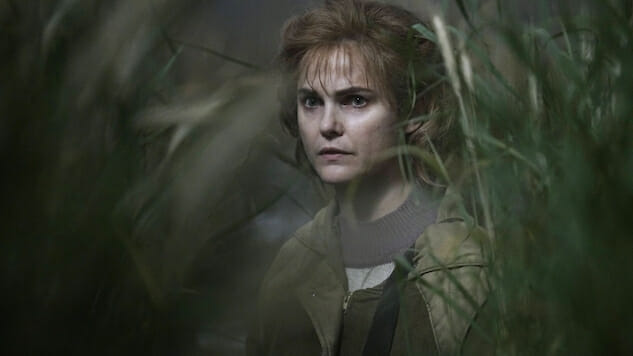The Americans: The Sincere Pleasures of “Slow” TV
(Episode 5.02)
Patrick Harbron/FX TV Reviews The Americans
In St. Clair County, Illinois, as her husband removes a robin’s nest from a stopped-up gutter and her daughter heads to second base with the boy across the street, Elizabeth Jennings (Keri Russell) comes upon a padlocked greenhouse, its modular structure far more modern than the neighboring clapboard barn. One might say the same for The Americans, now in the midst of another coup: “Amber Waves,” we learn in “Pests,” was no convenient metaphor, but rather the beginning of a multi-episode arc, similar in its keen design to the detour that wrought Martha’s exile; against the construction of the key sequence in “Pests,” or indeed William’s exhumation in the season premiere, many of The Americans’ cable competitors appear rickety by comparison.
Here, once again, the interlude’s success stems from its sonic complexion, namely the decision to scuttle the score in favor of the farm’s eerie noises. The crunch of the ground, the snap of the lock, the mechanical purr of the greenhouse: Elizabeth’s mission bears more than a passing resemblance to classic horror, its expectant silhouettes and creeping clamor, each new sound (air filtration, irrigation) a test of nerve. The camera, cautious, surveys rows of grain, first desiccated, then verdant—poison, I thought—before the sequence finally signals its purpose. The music arrives with the midges, their repellent hum punctuated by Elizabeth’s slap, and as we pull back, the pests of the title become a frightful swarm.
Inspired (fine, goaded) by more than one description of last week’s long, quiet climax as “boring,” I went into “Pests” wondering if my affection for The Americans had clouded my judgment, and I confess that the episode demands a modicum of patience before it works up a head of steam. (Even I struggled to stay focused during the discussion of food quality and corruption at a Moscow cocktail party.) But by the time “Pests” cuts to the image of insects circling the drain, as Elizabeth tries desperately to rinse the swarm’s remnants from her hair, it’s clear that the sequence detailed above rests on its deliberate construction: The Americans’ careful aesthetic, its uncommon precision, cultivates the sincere pleasures of “slow” TV.
Though it’s often used to suggest looseness or languor, a wastefulness of which The Americans cannot reasonably be accused—versus, say, Game of Thrones’ interminable, blandly conceived conversations, or Westworld’s willful obfuscation—the term is, in itself, simply the description of an approach to serial storytelling, one that echoes that creeping clamor, those expectant silhouettes. At its finest, The Americans turns on its sense of contrast: the silent stretch capped by the report of the gun, the dinnertime argument accompanied by the awkward silence, the metronomic training regimen interrupted by the surprising question. Its rhythms might seem halting, or “slow,” but it’s the changes of tempo that create the series’ sublime charge. The terrible sound of the pests escaping their stalks of grain works, in other words—and works brilliantly, I might add—not because it’s sudden, but because it’s delayed.
The remainder of “Pests” is less arresting, perhaps, but it’s arranged around much the same tension, drawn taut by the oppositional pull of expectation and execution. Paige (Holly Taylor) hasn’t snuck out to see Matthew (Danny Flaherty), thus exposing her parents; she’s crept into her closet, unable to sleep. Stan (Noah Emmerich)—at times giddily love struck, at others spitting mad—isn’t concerned that “everything’s not all right in Paigeland” because he suspects her parents are Soviet agents; Philip (Matthew Rhys) can’t know that, of course, so his face braces against his worst fears all the same. If this is “slow,” it’s also delicate, thoughtful, littered with little pinpricks of the conflicts now rounding into form: The camera catching Paige’s hand slide along the inside of Matthew’s thigh, for instance, or her rush of confidence as he compliments her independence (“You already do make your own decisions, Paige”), are meaningful because the episode pauses on Elizabeth’s mention of sex, and not in spite of it. There are others, too. It’s after being cast aside so quickly last season that Stan’s bitter reference to Frank Gaad’s death sends up our antennae, just as it’s the elongation of the disagreement between Pasha (Zack Gafin) and his father (Alexander Sokovikov) that allows Elizabeth’s response, “We understand,” to land.
As Tuan’s (Ivan Mok) hatred of his adoptive homeland continues to simmer, slipping into disgust with his unhappy mark, or as four words (“Stan Beeman sent me”) cause Oleg (Costa Ronin) to realize that returning to Russia was no clean escape, “Pests” points to The Americans’ enduring strength, which is the force it exerts in even its most circumspect moments. As with Elizabeth’s investigation of the greenhouse, the episode’s final scene, in which Paige’s parents teach her the technique they employ to keep their emotions in check, suggests the series in microcosm—rarely coercive, always controlled. It might appear as though The Americans can fit into the space between your thumb and your forefinger, but “Pests,” like “Amber Waves,” is a reminder of the power to be found in the small and the “slow.”
Matt Brennan is the TV editor of Paste Magazine. He tweets about what he’s watching @thefilmgoer.